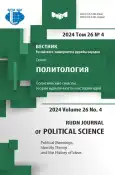“Moscovites” - “Non-Moscovites”: from the dichotomy of opposition to the search for identity
- Authors: Pochta Y.M.1
-
Affiliations:
- RUDN University
- Issue: Vol 26, No 4 (2024): Political Meanings, Identity Theory and the History of Ideas
- Pages: 786-806
- Section: IDENTITY AND SOCIO-POLITICAL DIVISIONS
- URL: https://journal-vniispk.ru/2313-1438/article/view/322408
- DOI: https://doi.org/10.22363/2313-1438-2024-26-4-786-806
- EDN: https://elibrary.ru/XBLWLA
- ID: 322408
Cite item
Full Text
Abstract
The article examines the role of Moscow as the capital of the Russian Federation, as a megalopolis in changing and supporting the value-civilizational specifics of Russian society, its influenceontheprocessofformationofthe Russiancivilizationalidentity, ensuringthefullsovereignty of the country. The methodology of the work includes civilizational analysis, concepts developed within the framework of identitarian research, recognition of the politicization of civilizational meanings, recognition of the civilizational meaning of identity as a key factor, recognition of the multiplicity of ways of political development as opposed to a linear normative model. The dynamic process of the formation of Russian identity is considered on the example of Moscow in sociocultural, economic, and political terms. The analysis of the results of student surveys in focus groups is given on who they can say “we” about, on the problem of resource allocation between Moscow and the regions, on obstacles to improving mutual understanding between Moscow and the regions, on what unites Moscovites and other Russians. It is shown that students give priority to the national civic identity and the value of the lifestyle associated with this identity. The problem of social justice in relations between Moscow and the regions attracts great attention of young people. The recommendation on the need for the practice of creating a single value field (institutional means, the role of religious organizations, the use of the discourse of an external threat) for a stable systemic connection between Moscow and the whole country in the context of identity politics is substantiated.
About the authors
Yuriy M. Pochta
RUDN University
Author for correspondence.
Email: pochta_yum@pfur.ru
ORCID iD: 0000-0001-9600-2665
Doctor of Philosophy, Professor of the Department of Comparative Politics
Moscow, Russian FederationReferences
- Gorshkov, M.K., & Tikhonova, N.E. (Eds.). (2018). Capitals and regions in modern Russia: myths and reality fifteen years later. Moscow: Ves Mir. (In Russian).
- Kashkabash, T.V. (2013). On the problems of Moscow identity. Theory and practice of social development, 10, 139–140. (In Russian).
- Kravchuk, A.V., & Methodieva, S.A. (2019). International migration as a political phenomenon. Theories and problems of political research, 8(5A), 157–166. https://doi.org/10.34670/AR.2019.44.5.017 (In Russian).
- Labutina, T.L. (Ed.). (2019). “Ours” / “Alien” in cross-cultural communications of Western countries and Russia. St. Petersburg: Aleteya. (In Russian).
- Makhrova, A.G., & Golubchikov, O.Y. (2012). The Russian city in the conditions of capitalism: Social transformation of inner-city space. Bulletin of the Moscow University. Series 5 “Geography”, 2, 26–31. (In Russian).
- Mchedlova, M.M. (2024). Identity as the basis of socio-cultural sovereignty of Russia. In M.M. Mchedlova et al., Post-Soviet identity of Russia and Armenia: The search for a path to the future. (pp. 315–339). Moscow: RUDN. (In Russian).
- Morozov, V.E. (2009). Russia and Others: Identity and Boundaries of the Political Community. Moscow: New Literary Review. (In Russian).
- Neumann, I.B. (2004). Uses of the Other: “The East” in European Identity Formation. Moscow: Novoe izdatelstvo. (In Russian) [Neumann, I.B. (1998). Uses of the Other: “The East” in European Identity Formation. University of Minnesota Press.].
- Plasseraud, Y. (2018). Citizenship/nationality in the East and West of Europe: Cultural borrowings or a conceptual dead end. In E.I. Filippova & K. Le Torrivellec (Eds.), Ours and others’. Metamorphoses of identity in the East and West of Europe (pp. 10–24). Moscow: Hotline — Telecom. (In Russian).
- Prokhorenko, I.L. (2018). European integration and the problem of separatism in the member States of the European Union. Moscow: IMEMO RAS. (In Russian).
- Prokhorenko, I.L. (2024). Identity as the key to understanding world politics. International analytics, 15(1), 11–19. https://doi.org/10.46272/2587-8476-2024-15-1-11-19 (In Russian).
- Reshetnikov, A. (2024). Chasing greatness: On Russia’s Discursive Interaction with the West over the Past Millennium. Ann Arbor: University of Michigan Press.
- Semenenko, I.S. (Ed.). (2023). Identity: personality, society, politics. New contours of the research field. Moscow: Ves Mir. (In Russian).
- Semenenko, I.S. (Ed.) (2017). Identity: Personality, society, politics. An encyclopedic publication. Moscow: Ves Mir. (In Russian).
- Silantieva, V.A. (2016). Regulation of migration processes as the basis of Russia’s national security. Historical and socio-educational thought, (3–1), 22–27. (In Russian).
- Todd, E. (2024). La defaite de L’Occident. Paris: Edition Gallimard.
Supplementary files









